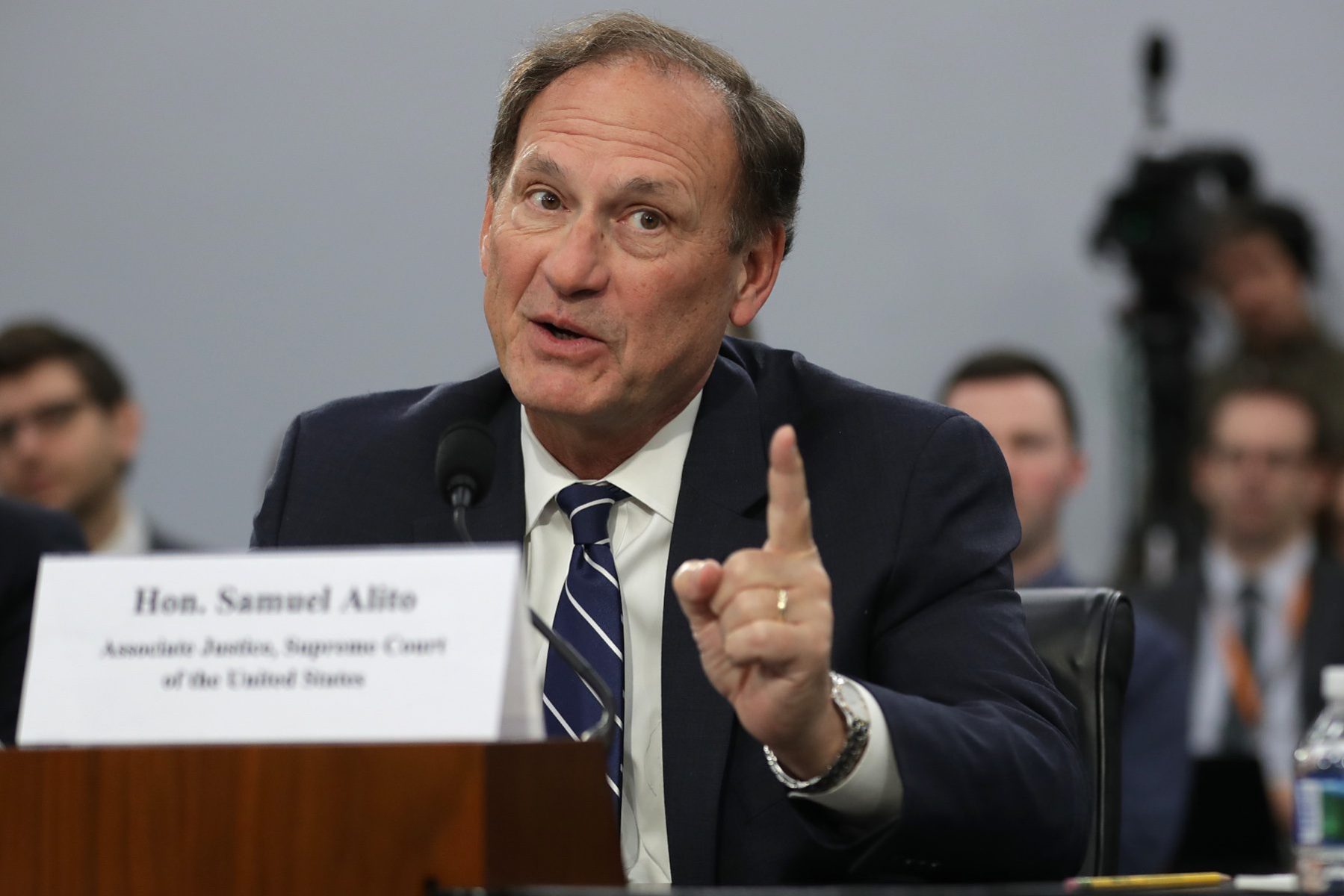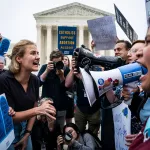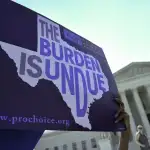In a leaked draft opinion that would overturn Roe v. Wade, Supreme Court Justice Samuel Alito argued that pregnant people don’t actually need access to abortion to ensure economic mobility — they already have it.
According to the opinion, which was published by Politico Monday night, “unmarried pregnant women” — Alito does not include all pregnant people in his opinion — now have access to pregnancy discrimination protections, “guaranteed” medical leave “in many cases,” and medical costs that are “covered by insurance or government assistance.”
Those “modern developments” contradict the position held by many economists and abortion rights advocates for decades, Alito wrote. In his opinion — which Chief Justice John Roberts confirmed was a genuine draft, but said was not the official decision of the court — Alito concludes that it’s not up to the Supreme Court to assess “the effect of the abortion right on society and in particular on the lives of women.”
But his argument doesn’t account for the significant limitations of the protections he lists and the persisting truth that the United States holds some of the worst records in the world in terms of pregnancy and birth-related workplace benefits, experts say. Some of the elements Alito describes in the opinion are still a work in progress. In other cases, they are leaving out some of the most vulnerable Americans.
The overarching argument Alito appears to be making is that the country has made strides since 1973, when Roe v. Wade went into effect, guaranteeing abortion rights up until fetal viability. Alito suggests that progress nullifies the connection between abortion access and economic justice. But experts on child care, paid leave and economics said his argument fails to capture how the protections codified into law in the past five decades are still not sufficient. The reasoning is also at odds with another stance held by some self-described anti-abortion feminists, who feel that access to abortion has stymied the development of robust policies to support pregnant people and families.
In terms of pregnancy discrimination, a bill with bipartisan support recently passed the U.S. House and is now being considered by the Senate to fortify workplace protections for pregnant people. But that bill was introduced precisely because significant loopholes still exist, even though Congress passed the Pregnancy Discrimination Act in 1978.
-
More from The 19th
- Abortion providers expected that Roe v. Wade could be overturned. But the leaked draft made it real.
- Tensions run high outside Supreme Court as hundreds gather after Roe v. Wade draft opinion leak
- Impacts of leaked Supreme Court draft decision could have a ‘chilling effect’ on abortion access
On what Alito characterizes as “guaranteed” family leave, the only workers who have anything close to guaranteed leave are the top 10 percent of earners in the country, 95 percent of whom have access to family leave that is unpaid, according to the Bureau of Labor Statistics. Only 36 percent of those highest earners also have paid family leave, and those numbers drop dramatically for the lowest paid workers, most of them women of color: 79 percent got unpaid family leave and only 5 percent had paid family leave in 2020.
Medical costs for birth are also still high, even with insurance coverage: about $4,300 on average for vaginal deliveries in 2015 and $5,200 for cesarean births, according to a wide-ranging study of more than 600,000 women in the United States between 2008 and 2015 who had health care insurance through their employer.
“The premise is false,” said Julie Kashen, a senior fellow and director for women’s economic justice at the Century Foundation, a progressive think tank. “Even if we had access to paid family leave and child care and insurance coverage for pregnancy and childbirth — even if we had all those things in place, which we do not, the need to have the right to abortion continues to exist.”
The United States ranks near the bottom of the list among advanced countries on how much it invests in child care, and it is one of only seven nations that has no national paid leave policy. Health care costs are so high in the United States, including for childbirth and pregnancy, that more than a third of American women reported skipping needed medical care, the highest rate among eleven high-income countries, according to a study by the Commonwealth Fund, a foundation providing health care research on vulnerable communities. (The study did not look at trans or nonbinary people.)
Abortion access and economic security have long been proven to have deep connections. A landmark study that followed two groups of women over 10 years — one group that wanted an abortion and got one and one that wanted one but did not get the procedure — found that those who were denied an abortion by a clinic because they were too late in their pregnancies sank deeper into poverty as a result.
The study, which did not look at outcomes for trans or gender diverse people, pinpointed the lack of abortion access as the turning point in the women’s economic trajectories, in part because there was little policy support federally and in their workplaces to help them raise their children without facing financial hardship.
The past two pandemic years have crystallized how little support there is for pregnant people and parents — so little, in fact, that women left the labor force in unprecedented numbers at the start of the COVID-19 crisis because of lack of access to paid leave and child care. In the wake of that exodus, policies to pass federal paid leave and free pre-Kindergarten got as close to becoming a political reality as they ever have in this country.
And yet, they have not passed.
Those who are most affected by the absence of those protections are the same group that will be affected by the lack of access to abortion: women and people of color.
“One of the things we have to remember is this narrative about abortion and who has access to abortion — we cannot forget that this is a race and class issue,” said Leng Leng Chancey, the executive director of 9to5, a national organization advocating for economic security for women of color.
If Roe is ultimately overturned, as the draft opinion suggests it will be, the decision on how to restrict abortion will be left up to states. Most of the states that have already passed abortion restrictions are in the South and Midwest, the same places that have higher concentrations of low-wage workers. It is those workers, the majority of them women of color, who will face the most significant barriers to abortion, who may not be able to travel to other states to undergo the procedure and who may not even have the time off from work or financial wiggle room to consider that option.
Chancey said that when she was pregnant with her first child, she earned $7.25 an hour working at a university and was spending $150 a week on child care. They had a cesarean birth and were back at work less than 8 weeks after the surgery.
“I was afraid to lose my job — who can access [unpaid family leave]? Nobody that’s working a minimum wage job, because you have to put food on the table,” they said.
Low-income people of color often can’t afford to be out of work without pay for extended periods of time, but they are also more likely to be single parents and caregivers.
“We live in a nation that penalizes caregivers and caregiving responsibilities,” said Josephine Kalipeni, the executive director of Family Values @ Work, a national network of state and local coalitions working to pass workplace policies including paid family leave. When she had an abortion while in college, part of the decision was driven by the fact that she was the eldest of six children, expected to be a caregiver for her parents and while completing her education.
Kalipeni said she was working three jobs at the time, struggling to pay off her tuition at the end of each semester.
“I had to think and really weigh the cost knowing that my parents would not have an inheritance to pass down to me in the future, that my financial wellness was as connected to theirs as their own independent finances were, and now to think about disrupting my education, incurring the costs of having a child and having a child in the United States? There was absolutely no way I could financially or emotionally have a child,” Kalipeni said.
If Roe is overturned, groups like hers will only be emboldened to fight more for the policies Alito suggests are already in the books, she said.
“It ramps up our work in its definitive terms, but I also think it ramps up our responsibility to talk about reimagining a democracy and an economy that works for all of us,” she said. “It becomes a uniting moment.”








